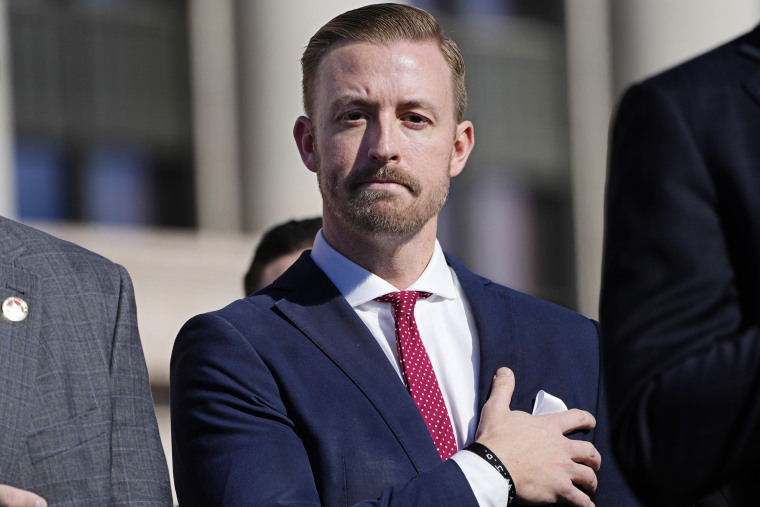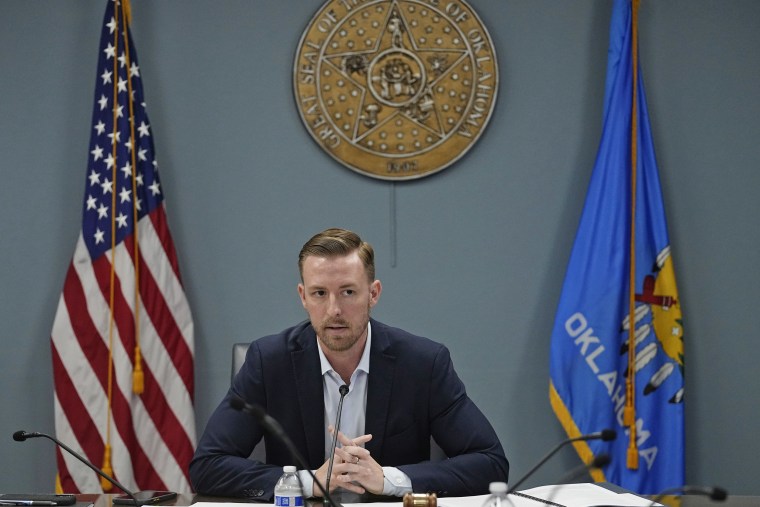

Since Ryan Walters was sworn in as Oklahoma’s superintendent of public instruction in January, he’s called for prayer in public schools and hanging the Ten Commandments in classrooms.
He’s adopted


Since Ryan Walters was sworn in as Oklahoma’s superintendent of public instruction in January, he’s called for prayer in public schools and hanging the Ten Commandments in classrooms.
He’s adopted
Ninety-four religious leaders in the state signed an open letter organized by the Oklahoma Faith Network, a nonprofit organization, asking Walters to retain the separation of church and state within public education. The Rev. Shannon Fleck, executive director of the Oklahoma Faith Network, said pushing one religion in public schools will make children of other faiths feel ostracized.
“He is doing all of these things so that he can advance politically, and it’s unfortunate because it’s going to happen with so much discrimination and pain in the wake of it,” Fleck said.
Walters has harsh words for those who push back on him. He called the state teachers union a “terrorist organization” during a legislative hearing. He branded journalists “a true enemy of taxpayers” for publishing criticism from a GOP state legislative committee chair, whom he called a liar.
Walters’ office declined interview requests and did not respond to written questions.
Before jumping into politics, Walters taught high school history and was a finalist for Oklahoma’s teacher of the year seven years ago. In 2020, he started an advocacy group that supported vouchers to help students attend private schools, and Republican Gov. Kevin Stitt appointed him secretary of education, which in Oklahoma is the governor’s top education adviser.
As education secretary, Walters was in charge of coordinating disbursement of nearly $40 million in federal pandemic funding, which two audits — one by the state and one by the federal government — found was mismanaged.
The audits found that the state had allowed money to be spent on kitchen appliances, power tools, televisions and Christmas trees. Walters faulted the vendor he had hired, but auditors said he had given a blanket approval on expenses through the system and failed to take advantage of an internal control option the company offered.
Walters’ election in the fall of 2022 gave him a bigger role: Rather than focusing on school accountability initiatives, he now oversaw the entire Oklahoma Department of Education. Things changed significantly once he took office, according to five former employees of the agency, all of whom left or were fired after he started. It took two months before Walters held an all-hands staff meeting, and they often found out about new policies, such as warning state vendors against sending “inappropriate materials” for classroom use, through videos Walters posted on X, formerly known as Twitter, former staff members said.
“I mean, everybody there, they’re just walking around like chickens with their heads cut off, because they have no idea what’s going on or what they’re supposed to do,” said Terri Grissom, who was in charge of writing grants for the department before resigning in April.
Walters said during the campaign that he would restrict the federal grants the state applied for, based on ideological concerns. Grissom said a top aide for Walters told her not to apply for federal grants that promote diversity measures, social emotional learning, programs to support LGTBQ students or “anything trauma-informed.”
Worried that Walters was leaving money for Oklahoma schools on the table, state legislators passed a law in May requiring the department to continue applying for any federal grant the state had received before Walters took office, unless he received permission from Republican legislative leaders.
The same month, a top aide for Walters warned in emails to staff that anyone caught leaking to the press would be fired. It turned out to be a trap; each of the 400 emails were unique. Walters received a round of applause when he described the operation at a June 7 OCPAC meeting, according to video of the event. He said the department caught “dozens” of leakers.
“They broke protocol, so don’t get mad at me for catching them doing it,” Walters said.

Two of the employees fired as a result have filed wrongful termination lawsuits. The department has responded that it was within its rights to terminate them, and the cases are pending.
According to screenshots of interview questions provided by one former employee, the department began asking prospective staff members if they would support Walters’ initiatives and if they were “aware of how politics plays a role” in the agency.
Perhaps the biggest fight he’s picked so far is with the Tulsa school district.
Walters first floated taking away Tulsa Public Schools’ accreditation in July in a news conference he held outside of the district’s offices to defend E’Lena Ashley, a conservative school board member who faced criticism for leading a prayer at a graduation ceremony this spring.
Walters has also hammered Tulsa schools, where more than three-quarters of students are economically disadvantaged, for low academic achievement scores, calling the district “uniquely bad.” Just 13% of students in the Tulsa district meet grade-level standards on the state test, according to 2022 state report cards. That’s below the statewide average of 28%, but slightly above the 12% of students who reach the standards in the Oklahoma City district.
The Tulsa district’s accreditation already had a warning strike against it. Last year, the state board decided a staff training presentation that asked teachers to examine their implicit racial biases violated the state’s anti-critical race theory education law.

If Oklahoma’s Board of Education eliminates the Tulsa district’s accreditation, the more than 33,000 Tulsa students would be reassigned to nearby smaller districts.
Walters alternately suggested this month that the state take over Tulsa’s schools. He cited the Texas state takeover of Houston’s public schools as a model. In Houston, state appointees are cutting hundreds of jobs and have ended contracts with psychologists, scaled back meetings with the teachers union and converted libraries to disciplinary centers.
The Oklahoma Board of Education, which Walters chairs, is expected to make a decision at its meeting Thursday.
Deborah Gist, the Tulsa superintendent, has defended her district, saying the state does not need to take away its autonomy. The district launched a five-year plan to boost its academics that includes enhancing student counseling, retooling curriculum, recruiting new staff and providing more information to parents.
She also criticized Walters.
“It’s very evident that this is all based on his own political and personal agenda,” Gist said in a phone interview last week. “I don’t think he understands what it takes to run a district.”
Gist announced Tuesday evening that she was leaving her superintendent job, hoping that will help ward off a state takeover. Walters praised the move as “a step in the right direction.” Gist said in a letter to staff that she did so with a “broken heart.”
State Rep. Mark Tedford, a Republican from a Tulsa suburb, said he’s pressed Walters to focus more on test scores rather than culture war issues, and he wants the state superintendent to take less drastic measures with the Tulsa school district.
“But I think a lot of the angst, a lot of the heat — even on these scores — is still about the underlying ideological differences between him and the educational community,” Tedford said. “And again, the people of Oklahoma elected him based on him running on these ideological differences.”
State Rep. Monroe Nichols, a Democrat who represents part of Tulsa, believes Walters is picking on his district as part of a play to demonize urban areas and school boards led by his critics.
“The challenge for us is, how do we in Oklahoma stop the bleeding on what is a national movement that will happen somewhere else if we allow it to happen here?” Nichols said. “You got Oklahoma, you got Texas, before you know it, you’ll see the same thing in Boise, Idaho, then you’ll see it pop up somewhere in Middle America, maybe in Ohio or something like that. You will start to see this happening across the country.”